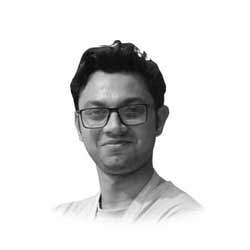By: Sultan ul Arifeen
In the pretext of deep disillusionment and remorse with the contemporary political experiments, the fundamentalist movements usually fright that secularism is to wipe-out the body of religion from the social order. Doing so, they observe the methods of rule espoused in their alleged golden ages and prime times. However, with the changing times, changes the sociopolitical stratum of the society, and looking back at the old methods opted centuries ago, is not a viable alternative in the modern-day world.
Since the advent of Islam in 610, it has had to have gone through a series of modifications to adjust itself with the new order of that time. Like all axial age religions, it focused on the reorganization of the moral fiber of the civilization. The egalitarian values of Islam were soon put in to a question, when the newly established polity was under the process of its expansion. With more territorial lands to be administered, it became evident that an apposite method of succession was compulsory to hold the large territory, now an agrarian in its nature. Imitating the political structure of the other agrarian societies, such as the Byzantines and the Persians, monarchy was introduced to govern the Muslim lands. With the passage of time, the position of caliph grew more centralized, hence becoming the epitome of power in Muslim world.
However, by the end of the millennium, the power of caliph had been completely devolved in the hands of armed commanders. To counter the crusades, Muslims commanders completely abolished the position of caliph and divided the Muslim world into several empires. These empires, needless to say, abode all the splendor and majesty of monarchs which Muslims of early days despised. However, they were successful in economics upgradation of their subjects. The empires not only addressed the political needs, but also elevated the educational structure in their premises.
Nevertheless, the gradual rise of western liberal ethos coupled with industrialized economy, shortened the already short lives of agrarian based thrifts. In addition to this, the neo-crusades in the form of colonization started taking all Muslim bases under their control, one by one. Instead of tuning themselves up with the new sociopolitical dynamics, the Muslims started their fundamentalist movements, owning the primitive ideals, which reasserted the western propaganda of orientalism against Muslims.
In the meantime, the groups within Muslims rose to power, by endorsing philosophies of secularism and democracy. However, those regimes flouted the core values of democracy, thereby started persecuting Muslim scholars and clerics. From the lone wolf of Turkey, Mustafa Kemal Atatürk to the Albanian Pasha of Egypt, Muhammad Ali; then later on, leader of the secular Arab, Jamal Abd al-Naseer and Pehalvis from Iran, all of them, in their attempts of realigning their societies to the substrata of modern secular world, usurped the voices of all devout scholars and started oppressing them. These acts lead to an eternal hatred towards the western beliefs and values in their entirety by the Muslims world. This campaign was led by Muslim Brotherhood and other fundamentalist organizations which sowed the seeds of exclusionism from all the urbane world. Clerics like Maududi and Syed Qutb expounded the most radical form of Islam and urged their followers to bring the old caliphate back. In the backdrop of this radicalisation, there is an increase hatred towards Muslims across the globe, especially after 9/11. According to the YouGov poll’s reports of 2019, 50 per cent US citizens consider Islam to be deviant from mainstream society, while 51 per cent believe that Muslim practices are anomalous. This led to the deterioration of average Muslim’s life in west. Pew survey of 2017 reported 75 percent of Muslims in Americas face discrimination.
Karen Armstrong has asserted, “Despite the conviction of many of the faithful in any tradition, who are convinced that religion never changes, it must change in order for it survive.” Owing to this necessity, Muslim scholars like Jamal ud Din Afghani and Dr. Muhammad Iqbal both emphasized that Islamic ideals needs reconstruction. They advocated the application of Ijtihad for Islam to adjust itself to the modern ethos. However, both of them unlike Sir Sayed Ahmad Khan held the position that, the given restructuring should not be based on the western values. Muslims need modernity, but not one that has been imposed upon by America, Britain or France. When Muslims look at western society, they see no light, no heart, and more importantly, no spirituality. They want to hold on their own religious and moral traditions and at the same time to try to incorporate some of the best aspects of western civilization. This is the only way forward.
The writer is student of political science. He can be reached at [email protected]
